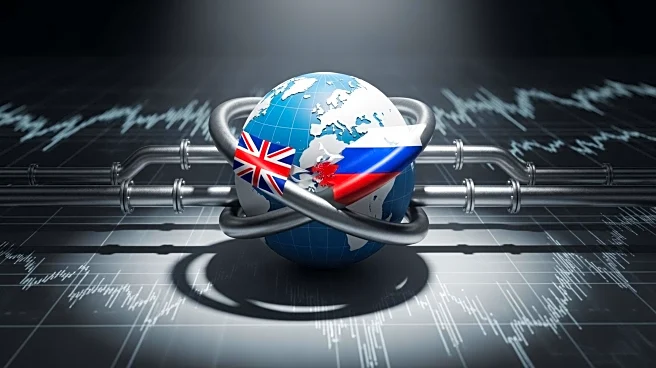What's Happening?
The UK government has imposed sanctions on Russia's largest oil companies, Lukoil and Rosneft, as part of efforts to cut Kremlin revenues funding the war in Ukraine. These sanctions target the export of 3.1
million barrels of oil per day, with Rosneft responsible for nearly half of Russia's oil production, which constitutes 6% of global output. The sanctions also extend to India's Nayara Energy Limited, which imported significant quantities of Russian crude oil. The UK aims to disrupt Russia's shadow fleet of oil tankers and has sanctioned 44 tankers involved in transporting Russian oil globally. Chancellor Rachel Reeves emphasized the move's potential impact on Russia's economy and its military operations in Ukraine.
Why It's Important?
The sanctions are significant as they aim to weaken Russia's economic foundation, particularly its oil industry, which is crucial for funding military operations in Ukraine. By targeting major oil companies and the shadow fleet, the UK seeks to send a clear message that Russian oil is unwelcome in global markets. This action could lead to increased energy costs worldwide, affecting businesses and consumers, especially in the UK. The sanctions also highlight the geopolitical tensions surrounding energy security and the global efforts to isolate Russia economically.
What's Next?
The UK government plans to continue ramping up pressure on companies in third countries, including India and China, that facilitate Russian oil exports. The sanctions are part of a broader strategy involving discussions with global counterparts, including the G7, to consider further measures against Russia. The European Union is also exploring legal avenues to seize Russian assets frozen since the invasion of Ukraine. These developments indicate ongoing international efforts to economically isolate Russia and support Ukraine's funding needs.
Beyond the Headlines
The sanctions raise ethical and legal questions about the use of economic measures to influence geopolitical conflicts. They also underscore the challenges of balancing energy security with political objectives. The impact on developing countries' energy security and the potential for further escalation in global tensions are critical considerations.










